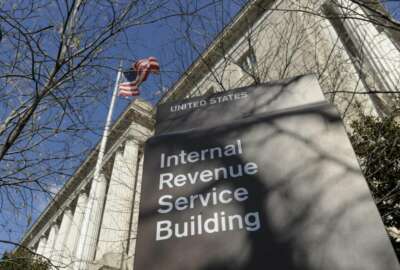

She may not be known to the general public, but this IRS executive helps tax preparers and the tax community generally navigate the system and also maintain...
Best listening experience is on Chrome, Firefox or Safari. Subscribe to Federal Drive’s daily audio interviews on Apple Podcasts or PodcastOne.
She may not be known to the general public, but this IRS executive helps tax preparers and the tax community generally navigate the system and also maintain professional standards. Especially important in a year like the IRS and the nation is going through. For more, the director of the IRS Office of Professional Responsibility, Sharyn Fisk, joined Federal Drive with Tom Temin.
Interview transcript:
Tom Temin: Mrs. Fisk, good to have you on.
Sharyn Fisk: Thank you very much.
Tom Temin: And just give us a sense of what’s been like for the tax community and the IRS with the pandemic, we know that the tax season was delayed, and that caused a lot of chaos. What’s it look like from your standpoint?
Sharyn Fisk: Well, it’s given us an opportunity to innovate. What do they say, necessity is the mother of invention. And so the IRS and the tax community is been adjusting to this new normal and finding new ways to get the job done to make sure everyone is compliant. And all tax administration runs smoothly. So it’s interesting times.
Tom Temin: And pretty much the filing season now is actually totally done.
Sharyn Fisk: No, actually, we have until October 15. So not quite done, but we’re in the final stretch.
Tom Temin: Well, I don’t know whether I’m getting a refund or not, but I’m gonna get right on it and make sure mine is in. But I want to talk about the Office of Professional Responsibility. What do you do there?
Sharyn Fisk: So I’ll give you the long explanation. The IRS Office of Professional Responsibility really supports effective tax administration by ensuring all practitioners and the tax system adhere to professional standards and follow the law. So the short explanation is, OPR, that’s what we call ourselves because we love acronyms in the IRS — OPR is charged with regulating tax practitioners, who are defined as individuals who practice before the IRS. So traditionally, you think about your enrolled agent or your CPA or attorney who’s dealing with the IRS on behalf of a client
Tom Temin: Is it anyone that does a tax return or do you have to have some higher level of interaction with the IRS?
Sharyn Fisk: So we call that practice. So when we talk about who practices before the IRS, practices contemplating all matters connected with presenting to the IRS regarding the taxpayers rights, or liabilities or privileges under the laws and regulations administered by the IRS. So typically, when someone prepares just to return and files it, they’re not communicating with the IRS, they’re not making a presentation to the IRS. But if somebody is under audit, or someone has collection issue that they’re handling for a client, or client receives a notice, and they want their CPA or their enrolled agent to contact the IRS, then that is practice before the IRS.
Tom Temin: Got it. And just out of curiosity of those that present before the IRS, what percentage roughly is representing individuals versus representing business entities?
Sharyn Fisk: I don’t have those stats down, but I would say it’s a significant portion represents individuals, there’s just a lot more of them than they are of the entities. And depending on the individuals, some may have challenges in meeting tax compliance, whether it’s a lack of experience or knowledge, whether it might be intentional, or whether they’re having an economic challenge and need help with paying their taxes or getting on an installment payment plan, or even just figuring out what their rights are.
Tom Temin: And if someone is not behaving in a way that meets professional standards, how does that get to the attention of your office and what happens when it does?
Sharyn Fisk: So we have actually a couple parts of our regulation duties. And our first one is we conduct outreach activities to make sure that those practitioners are aware, and they understand Circular 230 of what their professional responsibilities are. Now we do get referrals. And if we do such a thing, we’re going to have to do an independent investigation of any kind of allegation. And in which case, we propose and negotiate appropriate discipline for those practitioners who we determine have violated circular 230. And then we go through and we administer the administrative hearing and appeals rights process. And I want to point out an interesting note here that OPR is our statutory authority to actually address conduct of taxpayer representatives does not come from Title 26, which is the Internal Revenue Code, it actually comes from Title 31 of the US code of Section 330. So we’re actually an independent function from Title 26. That part, Title 26, is enforced by other divisions in the IRS. So basically, it’s this Title 31 that gives us a statutory authority to take discipline action against representatives who are incompetent or disreputable or who violate the regulations.
Tom Temin: And you sound like someone that might have taught this type of thing, perhaps to college students at one time.
Sharyn Fisk: Yes, I am a former professor teaching tax, which is my favorite subject, and ethics, which is my favorite subtopic within this topic of taxation. So to me, especially with students, you want to make sure that they are aware of their ethical and professional responsibilities very early in their career and that they have very strong ethical standards, and they know what their duties are, responsibilities are when they’re representing taxpayers and making representations to the IRS.
Tom Temin: And what are some common violations that you see what are some of the ethical lapses or professional lapses that tend to happen frequently?
Sharyn Fisk: Sure. So we have our top list here, which is basically one of our first ones, is incompetence and disreputable conduct, which is basically, for example, a practitioner was convicted of a criminal offence under the federal tax laws, or any sort of criminal offense involving dishonesty or breach of trust, or they give misleading or false information or participate in any way in giving misleading information to the Department of Treasury or an IRS employee, or the Tax Court for that matter. Another one is failing to meet the standards with respect to tax returns and documents and affidavits and other papers submitted to the IRS. So that’s basically not adhering to your due diligence responsibilities to make sure that everything that you’re providing to the IRS to the best of your knowledge is true and correct and accurate. You’re not misleading or making any kind of gross incompetence statements. Another one is assisting a client and violating federal tax laws. So when a tax practitioner is assisting a taxpayer in tax fraud, tax evasion.
Tom Temin: And do you pay attention, or does the agency — there are these outfits that advertise, I hear them on the radio all the time, and after they get through getting rid of your timeshare, they talk about how to — I’m kidding, it’s different outfits — but there are people that advertise no matter what you owe the IRS, we’ll get it cut down to a fraction of what you thought you owed, don’t get the IRS on you, we’ll get them off your back, this kind of thing — do those tend to be ethical in their actual practice?
Sharyn Fisk: I think some of them do. There are ethical programs and entities that will help a tax payer deal with their tax liability if they should have one. But also taxpayers should not be hesitant to contact the IRS themselves. There are operators and online assistance. There’s online programs to help you work out installment plans. There’s forms and instructions on how to do offers and compromise. So really, the IRS is trying to make this as easy as possible for a taxpayer to deal with any tax liability issues or deficiencies with the IRS directly without the need to spend additional costs in seeking help on that matter, especially when you realize if a taxpayer is having a financial issue, spending additional money is probably difficult for them.
Tom Temin: Sure. Now you have been on this job about nine months. And as you indicated, you were a professor of this on the west coast of tax ethics and tax law. What did you find inside now that you are inside the IRS? What did you find that you might not have expected from teaching all of this all of these years?
Sharyn Fisk: To be honest, I didn’t find anything different than what I anticipated. And that comes from years of teaching the topic and also understanding and reading it and engagement with the IRS itself through professional organizations, through the ABA and through the AI CPA. That really gives you an opportunity to meet the folks inside the IRS and get to know them. And an opportunity to understand some of the issues that they’re dealing with on the inside and how they’re working to assist taxpayers. Another great opportunity I had was I was a member of the IRS Advisory Council. It’s called IRSAC. And if anybody has an opportunity to do it, you have to apply and it’s a three year commitment. It is a phenomenal program where the IRS gets advice from outside external stakeholders, payroll societies, professors, lawyers, accountants CPAs. And they meet several times throughout the year and discuss issues and concerns within the IRS and propose solutions to those. So fortunately, I just finished rolling off my IRSAC duties just before I got this position. So I already had a great opportunity to meet quite a number of folks in the IRS and understand what they’re working on.
Tom Temin: And would it be fair to say that everybody, the IRS itself, the tax industry and tax payers all labor under the complexity of the tax code, which none of those parties actually control?
Sharyn Fisk: That would be Congress, but yes. And the IRS works to make sure that our tax practitioners within the Office of OPR understand those duties and responsibilities, and we also work on getting questions and guidance. We have webinars, we have opportunities to call in, really want to make sure that our tax practitioners who are helping those tax payers make sure that they meet their responsibilities.
Tom Temin: Sounds like you like the job.
Sharyn Fisk: I love it. Absolutely love it.
Tom Temin: Sharon Fisk is director of the IRS Office of Professional Responsibility. Thanks so much for joining me.
Sharyn Fisk: Thank you very much for the opportunity.
Copyright © 2024 Federal News Network. All rights reserved. This website is not intended for users located within the European Economic Area.
Tom Temin is host of the Federal Drive and has been providing insight on federal technology and management issues for more than 30 years.
Follow @tteminWFED


